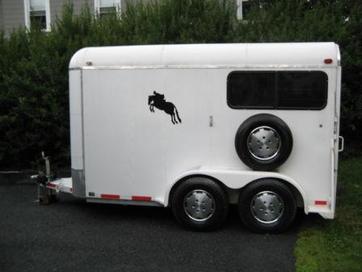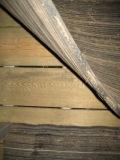Horse Trailer Care and Maintenance
Horse trailer maintenance and horse trailer care are integral to your horse's safety when he's on the road. If you own your own horse trailer, it is very important that you understand how to perform proper horse trailer maintenance. If you do not own a trailer but allow your horse to be trailered by someone else, it is still good to understand trailer maintenance so that you can ensure your horse is safe. When our horses travel with us they are at increased risk for injury, and we owe it to them to make sure every thing is functioning properly. 1. Make sure that there are no areas on the inside or outside of the trailer that are sharp and could cut the horse or a person
2. Check the floors. If you have an older model trailer with wooden floors, make sure they are solid and not rotten. Use rubber mats that allow horses to keep their footing in the trailer while rolling down the road.
2. Check the floors. If you have an older model trailer with wooden floors, make sure they are solid and not rotten. Use rubber mats that allow horses to keep their footing in the trailer while rolling down the road.
3. Check your tire pressure. This one is simple but important. Too low tire pressure can cause flats and damage your tires 4. Have the trailer axle bearings repacked with grease annually or biannually depending on how much you use your trailer (if you don't know what this means, seek professional help, but it's a simple process)
5. Check your trailer hitch for proper function
6. If you don't have a break away emergency braking system, get one! This will stop your trailer (and save your horses) should your trailer come unhitched from your truck. Note: the break away cable should be attached to a different part of your vehicle, not the hitch.
7. Have proper trailer ties to keep your horse from turning around during trailering. Really bad accidents can happen when you don't have trailer ties available and in use.
8. Ensure that you braking system/controller box is in good order
9. Make sure that all outside lights and signals are in working order. Reflective tape is an inexpensive addition to a trailer that gives it a lot more visibility for other motorists. Working interior lights are also useful for nighttime trailering
10. Check the ramp or doors. Ensure that all are opening, closing, and locking appropriately.
5. Check your trailer hitch for proper function
6. If you don't have a break away emergency braking system, get one! This will stop your trailer (and save your horses) should your trailer come unhitched from your truck. Note: the break away cable should be attached to a different part of your vehicle, not the hitch.
7. Have proper trailer ties to keep your horse from turning around during trailering. Really bad accidents can happen when you don't have trailer ties available and in use.
8. Ensure that you braking system/controller box is in good order
9. Make sure that all outside lights and signals are in working order. Reflective tape is an inexpensive addition to a trailer that gives it a lot more visibility for other motorists. Working interior lights are also useful for nighttime trailering
10. Check the ramp or doors. Ensure that all are opening, closing, and locking appropriately.


